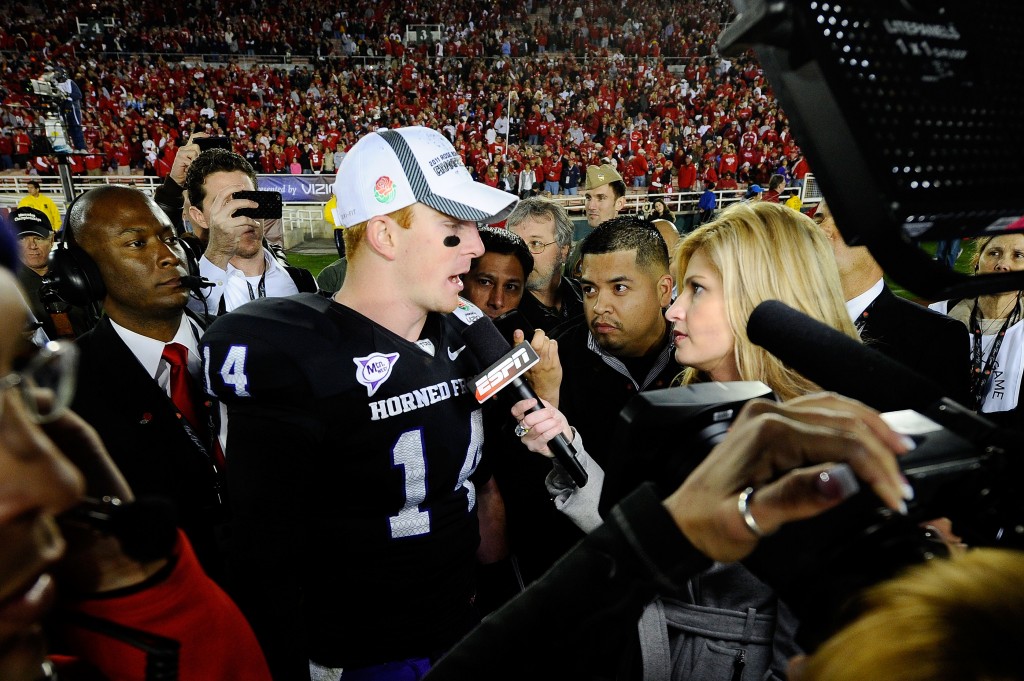Comment reply: B/R not trying to “protect” writers from access
Two days ago I wrote a post headlined “Access is a prize, but it comes at a price,” about the pitfalls and dangers that can come with being a credentialed reporter.
A commenter with the handle Babcocs2 responded:
I’m sorry, but this blog post comes across as having a blatant agenda. B/R knows that many of its writers were attracted by promises of potential press credentials, and that such promises have been an extremely valuable tool in recruitment. But the truth is, 99% or more of all B/R writers will never get those credentials. Sure, we all should have realized it was never going to happen when we joined, but some people still don’t. So B/R takes a “no, we didn’t exaggerate…we’re just trying to protect you!” stance.
I think that’s a pretty wild mischaracterization of the post, and I want to address it.
First of all, to say that B/R “attracts” writers with “promises of potential press credentials” vastly overstates what B/R says. Look at the “Why Write for Bleacher Report?” link in the footer of any B/R page.
The slide show lists reasons to write for B/R. On the third page of reasons, the seventh item listed, is “We get top writers credentialed and line up radio appearances and talent interviews.”
We’re not exactly saying, “Hey, come write for us and we’ll get you credentialed!” We’re saying that the top writers can get credentialed, and there are many other reasons to write for B/R that we list first. It’s not a bait and switch. Maybe 99 percent of all B/R writers will never get credentialed. I don’t know the actual figure. But a huge percentage have no interest in getting credentialed.
Bleacher Report gets several hundred new writing applicants a week and approves a few dozen. We have more than 7,000 approved writers, a figure we’re not shy about giving out. Even elementary logic would tell you that the vast majority will not get credentials. Where would they all sit? What press box is that large?
You have to earn your way to Featured Columnist status to even be considered for a credential that we arrange. But it’s unrealistic even to think all Featured Columnists can get access. We have nine FCs just for the Pittsburgh Steelers. No organization is getting that many credentials.
Rough estimate, around 10 to 15 percent of Bleacher Report Featured Columnists have either been credentialed or had athlete interviews arranged for them by B/R.
If Babcocs2 thought, “I’m going to sign up at B/R and get me a credential!” then I would suggest Babcocs2 read what he or she wanted to read, not what was there, as I think he or she did before commenting on the “access” post.
As for that post having the agenda of saying, “No, we didn’t exaggerate … we’re just trying to protect you!” Well, I’ve already dealt with the “we didn’t exaggerate” claim.
What that post is about is not “We’re trying to protect you from the evils of being credentialed. Believe us, it’s better without!” Access is fantastic. It’s one of the prizes of becoming a sportswriter, along with the adulation and the attention of supermodels.
What I was trying to say—and what I did say, right in the first paragraph—is that access is “also a minefield.”
If you get access, good for you! But be conscious of what that access means to your coverage, how it can color the way you think, the way you report and the way you write.
In one of the examples I gave, New York Times columnist Paul Krugman found that his unusual access on one story was tempting him to take his eye off the ball, to think about trivial advantages his access gave him, rather than thinking about the far more important issues he should have been considering and writing about.
The access he had—in the form of embargoed advance information—was a good thing. He needed it to write his story. But if he hadn’t been thinking consciously, paying attention to what’s important, that very access could have damaged his story.
Bleacher Report writers don’t need to be “protected” from access by me, this blog or anybody else. But we all need to be aware of where the hurdles are if we’re going to surmount them and do good work.
* * *
Photo: ESPN’s Erin Andrews interviews TCU quarterback Andy Dalton amid a scrum of reporters following the 2011 Rose Bowl. (Kevork Djansezian/Getty Images)
-
Isaac smith
-
Anonymous
-
http://liverpoolfootballblog.com acha5066
-
Anonymous
-
Kelly
-
Dorth
-
http://www.legionpost50ny.com Ken Kraetzer


